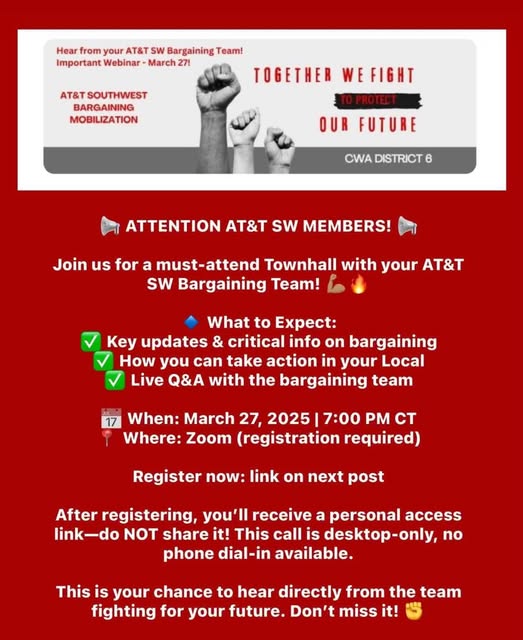ICE Access to CWA Worksites

June 30, 2025
CWA members have shared urgent concerns regarding ICE agents seeking access to worksites and employer actions related thereto. The CWA Legal Department is providing the following guidance for CWA Local officers and members:
ICE WORKSITE ACCESS
Judicial warrants are needed for ICE worksite access. These judicial warrants are ones that are signed by a US district court judge or state superior court judge, are dated within the past 14 days, and specify physical location to be searched and individuals.
Administrative warrants signed by ICE officials are not enough to allow entry to the worksite.
EMPLOYER ACTIONS
Employers should NOT be voluntarily permitting ICE agents to enter their private premises, including but not limited to non-public areas or places at the worksite where workers reasonably expect privacy. CWA’s position is that this is a mandatory subject of bargaining as it is a disruption of the workplace and production.
Employers should be posting signs on their premises that say “private property.” CWA Locals should be affirmatively asking employers to do that as no one can enter a private area without a judicial warrant or permission.
CWA Locals should be affirmatively seeking that employers ask to see a judicial warrant and, if they don’t have a judicial warrant, employers should ask them to leave.
CWA Locals should be affirmatively seeking that employers ask ICE agents, who enter the public area around the private premises, to leave if they don't have a judicial warrant.
CWA Locals should ensure that employers are not caving to pressures from ICE for instantaneous inspection of I-9 paperwork as employers have three days to comply with a request from ICE to inspect and verify I-9 paperwork.
WORKERS’ RIGHTS
At the Worksite
Workers have the right to remain silent and don’t have to speak or hand over ID if ICE gains access to the worksite.
Workers should not argue, lie or divulge information about immigration status.
Workers should not run from or touch or resist an ICE agent.
Workers can document the incident by taking notes, recording, and/or taking photos; however, workers should not physically resist if an ICE agent tries to take a phone. They should say that they have a First Amendment right to document the incident, and they don’t consent to handing over their phone.
If Detained and Arrested
Workers have the right to stay silent and should do so, except to ask to speak to their attorney or to get a list of attorneys to choose from.
Workers should not argue, lie or divulge information about immigration status, nor should they sign anything.
Workers have a right to one phone call, and, if it's with an attorney, then it cannot be recorded (any calls with family or friends can be recorded, so workers should be wary about divulging info that can be used against them).
Workers may contact a consulate for assistance.
We hope this information is useful. Please keep the CWA Legal Department apprised of any related worksite activities, so that we may provide updates to all.

Townhall with your At&t SW Bargaining Team


